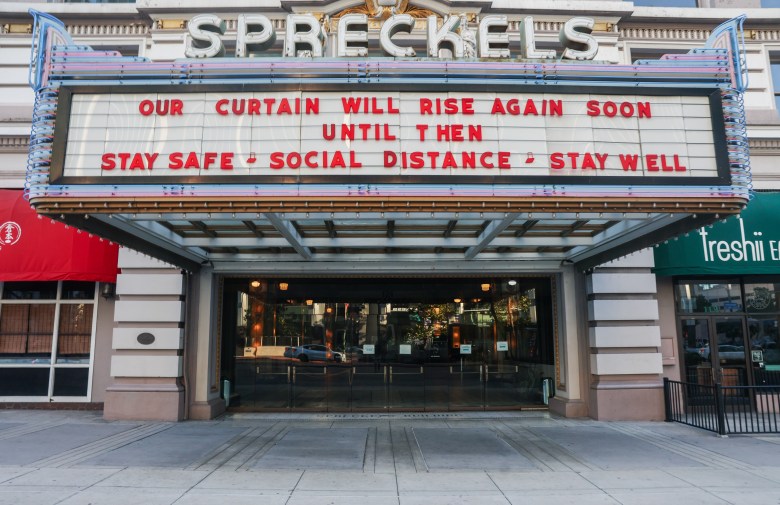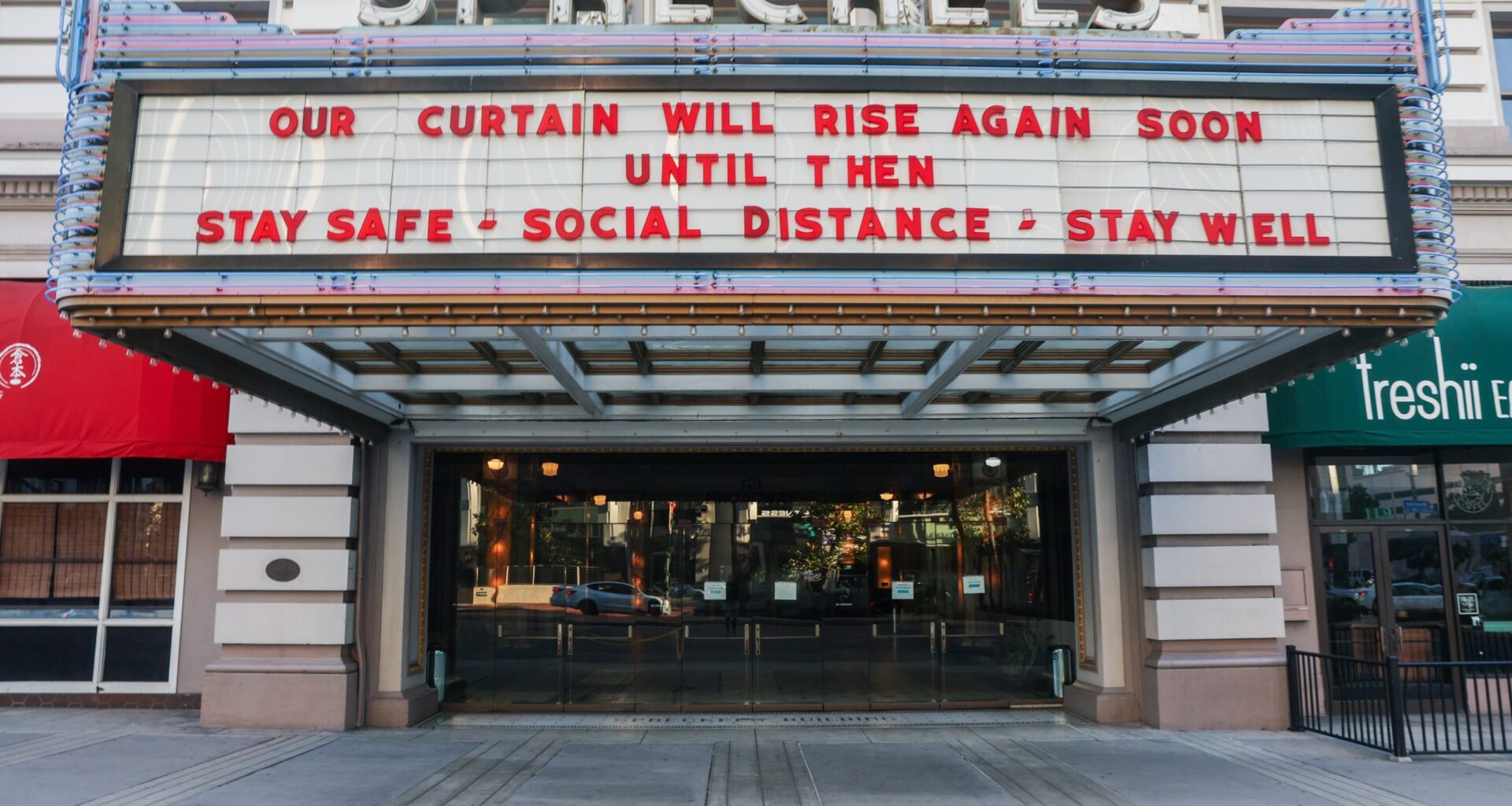 The Spreckles Theatre marquee in November of 2025. (Photo by Adrian Childress/Times of San Diego)
The Spreckles Theatre marquee in November of 2025. (Photo by Adrian Childress/Times of San Diego)
For nearly six years, Spreckels Theatre has stood frozen in time, a visible monument to the early tumult of the COVID-19 pandemic to anyone passing on Broadway.
Its marquee has remained unchanged since 2020, urging the community to stay safe and socially distance nearly six years later.
The marquee letters promise “our curtain will rise again soon.” The community is still waiting for that to happen.
The building spans a block on what was once San Diego’s main thoroughfare. A few tenants in the surrounding six-story Spreckels Theater Building remain, including Junk King, which lists its address at 121 Broadway Suite 357.
Its neighboring downtown theaters reopened as isolation orders fully lifted on June 15, 2021, bringing visitors back to downtown. Yet Spreckels Theatre stayed shuttered.
A show has not been held in the 1,400-seat theatre since two sold-out Jason Mraz concerts in February 2020. Its official website domain now promotes gambling in Indonesian.
Balboa Theatre and the Civic Theatre, both operated by nonprofit San Diego Theatres on behalf of the city,host regular live performances like touring Broadway musicals, standup comics, ballet productions and film screenings with musical accompaniment since reopening in November, 2021.
Nearly two years after Spreckles’ marquee began promising that its curtain would rise again, the San Diego Symphony launched a $125 million renovation of its nearby Copley Symphony Hall. It reopened as the Jacobs Music Center more than a year ago.
Even the Lyceum Theatre, which lost its resident theater company in 2022 when San Diego Repertory Theatre shuttered due to financial struggles, is ready to reopen.
“(Lyceum Theatre) has been fully renovated. It’s ready to be open when Horton Plaza opens back up,” said Jonathan Glus, former executive director of the city’s Commission for Arts and Culture who currently works at the Downtown Partnership. “So that will be good news in the coming months.”
Glus could not comment on the status of Spreckels Theatre.
The Balboa, Civic and Lyceum theaters are all owned or managed by the city of San Diego.
But since 2021, the shuttered Spreckels Theatre has been owned by private equity real estate firms.
With an $18 million bridge loan from El Segundo-based Thorofare Capital, the NYC-based firms Taconic Capital Advisors and Triangle Capital Group purchased the national historic landmark for $26.5 million in April 2021.
The firms said after a restoration by architect Ware Malcolmb, the theater would be managed by ASM Global, the international venue operator that ran Pachenga Arena.
In the intervening years, Callodine Group bought Thorofare Capital, Axonic Capital took over the commercial real estate arm of Taconic Capital and live-events company Legends acquired ASM Global, rebranding as Legends Global.
It’s unclear what is planned for Spreckels Theatre today. No representatives for any of the above companies responded to requests for comment.
Councilmember Stephen Whitburn, who represents downtown, said he has also never spoken to or met with the theater’s owners.
“The Spreckels Theatre is one of downtown’s most iconic spaces and has unfortunately sat empty since the COVID pandemic,” he told Times of San Diego in a statement. “As we work on the Civic Center revitalization, this site offers a real chance to breathe new life into the block. I’d welcome a thoughtful project that brings activity and energy back to the area while still honoring the theater’s legacy.”
The owners have never advanced serious plans for a restoration project. The city has records of only two permit applications from Spreckels Theatre in the past five years. One was approved for immediate tenant improvements to plumbing. The other application, for concrete infill in a dumbwaiter and other spots, expired.
As a national historic landmark, owners have to preserve the Chicago-style building. However, keeping it operating as a theater is not required.
The closure is a loss for the arts community and efforts to promote downtown as a tourist destination. None would have mourned it more than the theater’s previous owner, Jacquelyn Littlefield.
Littlefield was the daughter of a Hollywood executive who once cornered the market on San Diego movie theaters. Her father, Louis B. Metzger, starting in 1931 held the lease for the theater, which was considered the best theater west of the Mississippi when it opened in 1912, according to the San Diego Union-Tribune. He tried to purchase the property in 1942 but was outbid — a situation which the family believed contributed to his heart troubles.
On his deathbed a year later, he urged his 22-year-old daughter to hold onto his favorite property’s lease, buy it if possible, and to never let it be demolished. She honored his dying wish, becoming the theater’s fiercest guardian.
It finally came to market in 1962 and she bought it for $1.65 million. Littlefield held on to the property until her death in 2019. Through that time, she kept it open as a flagship theater.
When movies began showing in boxy multiplexes in the suburbs instead of movie palaces in downtowns, she brought back live performances to its unusually large stage. She became a key figure in San Diego’s performing arts community, known for advancing the San Diego International Fringe Festival, Mainly Mozart, Arts Tix and other programs.
In 1978, she offered up Spreckels as a temporary home for The Old Globe’s shows when its building burnt down.
Throughout her 57 years of ownership, she weathered pressure from city hall and developers to demolish the building as office towers rose around it.
Littlefield refused, saying, “Would you take a knife to a Picasso?”
She was branded “the difficult woman” for her defiance.
“The downtown establishment was all men. They tried to pat her on the head and make her go away, and she wouldn’t,” said Welton Jones, the Union-Tribune’s retired arts critic, in her obituary.
Jones said her treatment made Littlefield prickly and suspicious, alienating her from San Diego and some in the arts community.
Even her critics acknowledged her tireless work as the theater’s steward kept it operating until her death at age 96 in a La Jolla nursing home. Others, like Fringe Fest artists, mourned her as a longtime supporter who did much for the arts in her lifetime.
A year after she died, commercial real estate firm Cushman & Wakefield listed the property for sale, setting off the chain of events that left the building preserved in amber today, without the life that once animated its stage.
READ NEXT
